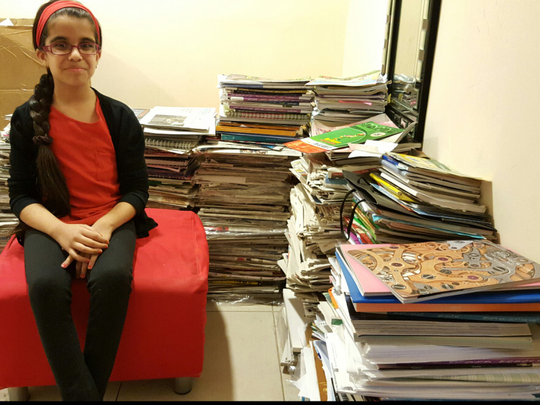
The issue of paper wastage has been discussed a number of times, but it still needs addressing. A few days ago, while standing in a queue at the ticket counter at the Deira City Center Metro station, I saw a gentleman buying his Metro ticket and when he got the receipt he crumpled it in his fist. As he walked, I saw him tossing it in the trash can. This happened despite the fact that every Metro station has a box to deposit your receipts for recycling.
In a separate incident, I was sitting on a bench at a mall in Dubai when I saw people accepting brochures of a water purifying product from a salesperson standing at a kiosk and then throwing them in the next trash can ahead.
These are just two instances that I witnessed in the past few days, but on speaking to people around me, I realised that paper is wasted carelessly every day.
Ghazi Zubair, an architect based in Sharjah, is amongst them and has witnessed paper being wasted in large quantities. “I did not realise that wasting paper has such negative effects on the environment,” he said.
Mallika Sarkar, a homemaker based in Dubai, blames it on people’s lazy attitudes.
“I think people don’t want to make the effort of finding a recycle bin. I think awareness in schools is the key because children can go back home and educate their families,” she said.
Ms Ranju Anand, vice president at GEMS Education, blames littering on a lack of knowledge.
"Just like we have to be kind to each other, we have to be kind to the planet that we call our home. When I see people throwing paper carelessly, I think it's a lack of knowledge and information. They've not been told by a strong role model, such as a parent or a teacher, that paper wastage has a huge detrimental effect on our planet. As responsible adults, we have to know that this planet is a shared abode and we have an equal responsibility to take care of it,” she said.
Anand teaches her children to reuse old newspapers. They create “paper bowls and many other display items from old paper”, which are used at home or as gifts. They don’t even buy gift wrapper and instead recycle paper.
Ms Meenakshi Dahiya, a principal at a Dubai-based school, agrees that learning begins at home.
"If each one of us took responsibility for our own actions, we would not need campaigns. We need to understand that cumulative result of individual efforts would have a huge impact. I learned that we have to use all commodities wisely, paper included, from my parents. And that value I have passed on to my children. Learning begins at home. There should be some kind of monitoring system set in place where the paper usage and recycling of households is measured," she said.
She believes that children need to be taught from an early age, and I agree.
We are not recycling enough, despite the fact that we live in a country that is so passionate about environmental concerns and has amazing infrastructure for recycling. Instead of tossing your receipt in the trash can, keep it in your wallet or handbag and then throw it in the next recycling bin you see. Or if you don’t really want a brochure of a product, just be polite and say no to the salesperson instead of taking it and trashing it. Very simple lifestyle changes can add up to big results.
We should recycle all our paper waste and use the recycle bins abundantly available all around. You can also collect used paper and give it to environmental or government organisations for recycling. I give all the used paper from my house as well as that of my neighbours’ to the Dubai-based Emirates Environmental Group.
Additionally, we can also reduce paper consumption if we print less. Many of us have smartphones and have such easy access to information.
Paper is one of the largest produced and used commodities in the world. In the last two decades, the usage of paper has seen a growth of 126 per cent, as stated by thepaperlessproject.com.
The website states that 1 million tonnes of paper is used in the world every day, which means that 365 million tonnes of paper is used in the world annually. Unfortunately, only 30 per cent of this paper gets recycled, a rather disheartening figure.
Paper wastage is a critical issue, which needs to be understood by everyone. Whenever a piece of paper goes to the trash can, it’s not just that paper that has been wasted.
Producing paper requires fuel, energy, there are transportation and distribution costs and of course there’s water used. According to the World Wide Fund for Nature (WWF), 10 litres of water is used to manufacture just one sheet of A4 size paper!
Additionally, 93 per cent of all paper produced comes from trees. If the current rate of deforestation continues, it will take less than 100 years to destroy all the rain forests in the world. Approximately 25 per cent of the global landfill waste comprises of paper. This paper when rots, produces methane, a greenhouse gas more potent than carbon dioxide in trapping heat.
This statistic just proves that efforts need to be taken up several notches on the level of the individual. WWF’s official website has some statistics on what we save if we recycle 1 tonne of paper. It includes 17 trees, 7,000 gallons of water, 390 gallons of oil, three cubic yards of landfill space or 4,000 kilowatts of energy.
— The reader is a student based in Dubai.
Be a community reporter. Tell us what is happening in your community. Send us your videos and pictures at readers@gulfnews.com








